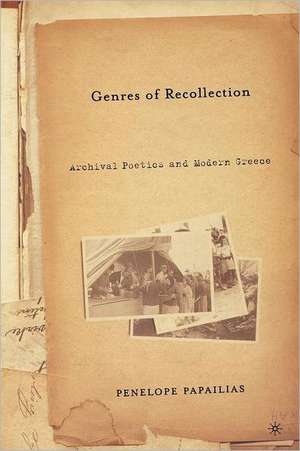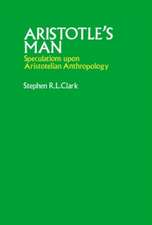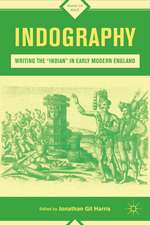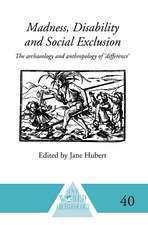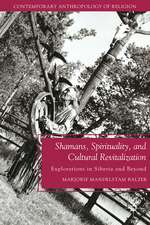Genres of Recollection: Archival Poetics and Modern Greece: Anthropology, History and the Critical Imagination
Autor P. Papalias, Kenneth A. Loparoen Limba Engleză Paperback – 6 ian 2006
| Toate formatele și edițiile | Preț | Express |
|---|---|---|
| Paperback (1) | 389.31 lei 6-8 săpt. | |
| Palgrave Macmillan US – 6 ian 2006 | 389.31 lei 6-8 săpt. | |
| Hardback (1) | 393.90 lei 6-8 săpt. | |
| Palgrave Macmillan US – 6 ian 2006 | 393.90 lei 6-8 săpt. |
Preț: 389.31 lei
Nou
Puncte Express: 584
Preț estimativ în valută:
74.49€ • 81.17$ • 62.77£
74.49€ • 81.17$ • 62.77£
Carte tipărită la comandă
Livrare economică 23 aprilie-07 mai
Preluare comenzi: 021 569.72.76
Specificații
ISBN-13: 9781403961068
ISBN-10: 1403961069
Pagini: 320
Ilustrații: XV, 301 p.
Dimensiuni: 152 x 229 x 22 mm
Greutate: 0.45 kg
Ediția:2005
Editura: Palgrave Macmillan US
Colecția Palgrave Macmillan
Seria Anthropology, History and the Critical Imagination
Locul publicării:New York, United States
ISBN-10: 1403961069
Pagini: 320
Ilustrații: XV, 301 p.
Dimensiuni: 152 x 229 x 22 mm
Greutate: 0.45 kg
Ediția:2005
Editura: Palgrave Macmillan US
Colecția Palgrave Macmillan
Seria Anthropology, History and the Critical Imagination
Locul publicării:New York, United States
Cuprins
Preface In the Margins of History: Peripheral States, Personal Archives and Historical Rhetorics Beyond Historiography Citing the City: Local Historians and the Possession of the Past Transcriptions of Home: An Archive of Refugee Testimony Reading War: Responsibility in Fiction Editing Migration: The Repatriation of the Story of 'Amerika' Epilogue: Textual Ethnogaphy and Historical Anthropology
Recenzii
'In Genres of Recollection, Penelope Papailias has given us a genre that productively defines recollection. Her book is an original exploration in the elusive but vital common ground of anthropology and history. Avoiding the abstruse abstractions that so often bedevil considerations of epistemology, Papailias brings to life the everyday social practices involved in the production of history by local writers and collectors and thereby challenges us to examine and compare the social conditions of our own intellectual production. An original and beautifully written contribution to the ethnography of Greece, this work is also an unusual experiment in the broadening of the anthropological vision.' - Michael Herzfeld, Harvard University
'In these stunning chapters on modern Greek history Penelope Papailias bypasses old disciplinary constraints to set forth a new theory and practice of anthropological reading. She finds her alternative archives in the works of amateur historians,the transcripts of Anatolian refugees, the memoir of a migrant to America, and a novel on the Civil War. The result is sustained interrogations and incisive insights concerning both the notion of an 'archive' and the historical phenomenon that is 'Greece.'' - Brinkley Messick, Professor of Anthropology, Columbia University
'The author responds to the famous question, 'What is History?' with the phrase 'Let's see what historians do.' Then, to explore this perspective, she gives the reader an ethnographic tour of historians' social worlds, thoughts and craft. I find this response quite ingenious. It is an original approach to writing about the writing of history.' - Antonis Liakos, Professor of History, University of Athens
'In these stunning chapters on modern Greek history Penelope Papailias bypasses old disciplinary constraints to set forth a new theory and practice of anthropological reading. She finds her alternative archives in the works of amateur historians,the transcripts of Anatolian refugees, the memoir of a migrant to America, and a novel on the Civil War. The result is sustained interrogations and incisive insights concerning both the notion of an 'archive' and the historical phenomenon that is 'Greece.'' - Brinkley Messick, Professor of Anthropology, Columbia University
'The author responds to the famous question, 'What is History?' with the phrase 'Let's see what historians do.' Then, to explore this perspective, she gives the reader an ethnographic tour of historians' social worlds, thoughts and craft. I find this response quite ingenious. It is an original approach to writing about the writing of history.' - Antonis Liakos, Professor of History, University of Athens
Notă biografică
PENELOPE C. PAPALIAS is a lecturer in Anthropology at the University of Thessaly in Greece.
